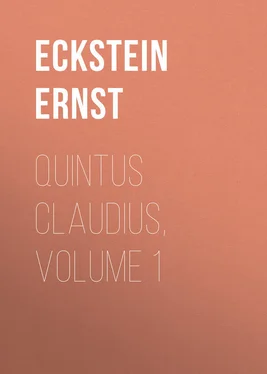Ernst Eckstein - Quintus Claudius, Volume 1
Здесь есть возможность читать онлайн «Ernst Eckstein - Quintus Claudius, Volume 1» — ознакомительный отрывок электронной книги совершенно бесплатно, а после прочтения отрывка купить полную версию. В некоторых случаях можно слушать аудио, скачать через торрент в формате fb2 и присутствует краткое содержание. Жанр: foreign_antique, foreign_prose, на английском языке. Описание произведения, (предисловие) а так же отзывы посетителей доступны на портале библиотеки ЛибКат.
- Название:Quintus Claudius, Volume 1
- Автор:
- Жанр:
- Год:неизвестен
- ISBN:нет данных
- Рейтинг книги:4 / 5. Голосов: 1
-
Избранное:Добавить в избранное
- Отзывы:
-
Ваша оценка:
- 80
- 1
- 2
- 3
- 4
- 5
Quintus Claudius, Volume 1: краткое содержание, описание и аннотация
Предлагаем к чтению аннотацию, описание, краткое содержание или предисловие (зависит от того, что написал сам автор книги «Quintus Claudius, Volume 1»). Если вы не нашли необходимую информацию о книге — напишите в комментариях, мы постараемся отыскать её.
Quintus Claudius, Volume 1 — читать онлайн ознакомительный отрывок
Ниже представлен текст книги, разбитый по страницам. Система сохранения места последней прочитанной страницы, позволяет с удобством читать онлайн бесплатно книгу «Quintus Claudius, Volume 1», без необходимости каждый раз заново искать на чём Вы остановились. Поставьте закладку, и сможете в любой момент перейти на страницу, на которой закончили чтение.
Интервал:
Закладка:
The third letter, also addressed to Quintus, was from Lucius Norbanus, 110 110 Lucius Norbanus. See Dio Cass., LXVII, 15.
the captain of the praetorian guard. 111 111 Praetorian guard. The commander-in-chief’s tent in the Roman camp, was called the praetorium; and from this the general’s body-guard received the name of cohors praetoria . Augustus transferred this title to the imperial guard, and established nine Praetorian cohorts, (each consisting of a thousand men) which were stationed, some in Rome and some in the rest of Italy. The cohorts in Rome were at first quartered among the citizens; afterwards they had barracks of their own ( castra praetoria ) on the opposite side of the Quirinal Hill. They, with the Praetorian cavalry, formed the imperial guard and body-guard. Compared with the other soldiers, they had many privileges, for instance a shorter time of service, higher pay, higher rank, etc.
“Have you taken root in your horrid country villa" – so wrote the officer in his rough fun – “or have you drowned, in Vesuvian wine, all remembrance that there is such a place as the Roman Forum? How I envy you your unbridled wild-horse-like liberty! You live like the swallows, while I – it is pitiable! Day after day at my post, and for the last few weeks leading a perfect dog’s life! Almost a third of the legion are new recruits, for again every hole and corner seems haunted. Today, I breathe again for the first time, but alas! my best friends are still absent. Above all Clodianus, 112 112 Clodianus. See Suet, Dom. 17.
who lately has never been allowed to leave Caesar’s side. I am commissioned by our charmer Lycoris, to inform you that Martial’s recitation 113 113 Recitation. The custom universally prevailed of poets reciting their verses to a select circle, before they were published.
on the sixteenth of October is proceeding to admiration. A hundred epigrams, and half Rome lashed by them! The banquet, which is to close the recitation, is to be magnificent. I can take her word for it; we know our fair Gaul. Farewell!”
“That is capital!” said Quintus, folding up the letter. Lucilia retired with her adopted father’s letter to the sleeping-rooms, where Claudia and Octavia must by this time be up. Quintus went into the atrium and sat down by the fountain, to wait till Caius Aurelius should appear.
CHAPTER V
The day of their departure came. Aurelius had hailed the idea of travelling with his new friends with an eagerness, that had brought a saucy smile to the lips of the shrewd Lucilia. But he had nevertheless preferred the more comfortable sea-voyage to a journey by land, and he had urged it so pressingly and yet so modestly that Octavia, after some hesitation, had yielded.
The second hour after sunrise 114 114 The second hour after sunrise. The Romans divided the day, from sunrise to sunset, into twelve hours. These were of course shorter in winter than in summer. The events spoken of in this chapter are supposed to have taken place about the time of the equinox, so ‘the second hour’ would be between seven and eight. The night, between sunset and sunrise, was likewise divided into four vigils or watches of three hours each.
had been fixed for their start, and before daybreak the slaves were already busied in packing the baggage mules and preparing the litters in the forecourt. The noise and bustle aroused Quintus, and being unable to get to sleep again he rose, dressed for the journey, and went out to the pillared court, where Lucilia was overlooking the slaves at their work and urging the dilatory to haste in cheerful tones.
“Restless being!” said Quintus in Greek: “Are you pursued by the gadfly of Juno, 115 115 The gadfly of Juno. The jealous queen of heaven, Hera, (called by the Romans Juno) transformed the beautiful daughter of Inachus, Io, who was beloved by Jupiter, into a cow, and ordered her to be persecuted by a gadfly.
that you set all the house in an uproar in the darkness of dawn? You must be afraid lest Aurelius’ vessel should row of without us.”
“And do you complain of my carefulness?” retorted Lucilia. “Punctuality is the first virtue of a house mistress.”
“Aha! and since Lucilia’s ambitions aim at that high dignity…”
“Laugh away! A well-ordered home is very desirable for you; and it will be a real mercy when you get married. Since you have lived alone, you have got into all sorts of mischief. But what is it that you want here, you ugly Satyr? Do you not see that you are dreadfully in the way? There, now you are treading on the travelling-cloaks! I entreat you leave the room to the household gods!”
“What! I am in your way? That is your view of the matter; but it is you who are really the spoil-peace, the eternally restless storm who have so often come sweeping down on our idyllic calm. Of all the things, which remind us here of Rome, you are the most Roman. You have nothing but your little snub-nose to redeem you a little. But, by Hercules! when I see you bustling around here, I can picture to myself all the fevered turmoil of the great city 116 116 The great city. The population of Rome, under the emperors, was a little less than two millions, but largely exceeded one million. There are no exact statements; but calculations have been made from different standpoints, which give about the same result. The most important points to be considered here, are first the extent of surface occupied by imperial Rome, and secondly the estimates of ancient writers concerning the consumption of grain, which in the time of Josephus amounted to 60.000,000 bushels yearly. Here too, may be mentioned the somewhat hyperbolical passage, Arist. Encom. Rom. p. 199, where it is asserted that Rome would fill the whole width of Italy to the Adriatic Sea, if the stories of the houses, instead of being piled one above another, had been built on the ground.
with its two million inhabitants. Well, I will taste the sea-breezes once more – once more, for a brief space, enjoy peace and quietness.”
“How?”
“I will wait for sunrise at the top of the hill, where the road turns down to Cumae. In Rome it rises through smoke and mist; while here – oh! how grandly and gloriously it mounts from behind the cone of Vesuvius…”
“And rises there through smoke and mist!” laughed Lucilia. “Well, make haste and come back again, or we shall set off without you.”
She turned once more to the slaves. Quintus wrapped himself in his ample lacerna, 117 117 Lacerna. A light woollen cloak, worn either in place of the toga or tunic, or, which was more customary, as an outside wrap over the toga. White lacernae were the most elegant.
waved his hand to her, and went out.
The high-road was absolutely deserted; he drew a deep breath. It was a delicious morning. His wish to bid farewell, as it were, to the sun and air of Baiae was not affected; like all Romans he raved about the sea. 118 118 He raved about the sea. The Romans’ love for the sea is proved by many passages in their literature, but still more by the ruins of their villas and palaces, which bordered its most beautiful shores, and were praised by contemporaries for their views, (Friedlander, Sittengesch. , II, p. 129).
Its shore was to him the one real Museion – as Pliny the younger 119 119 Pliny the Younger. C. Plinius Caecilius Secundus, a nephew and adopted son of the older Pliny, was born A.D. 62, at Novum Comum, now Como, on the Lake Larius, Lake of Como, on the banks of which he had several villas. ( Ep. IX. 7.) He died about the year 114. A clever writer, a skilful statesman, an enthusiast for everything good and beautiful, he possessed an amiable character, but cannot be wholly absolved from the reproach of self-sufficiency. His writings, especially his letters, are an important source of information concerning the social conditions of that period. The passage in Pliny to which allusion is here made, runs: "Oh, sea! Oh, strand! Thou beloved Museion! How much ye compose and create for me!“
had once expressed it – the true abode of the Muses, where the celestial powers seemed nearest to him; here, if anywhere, while watching the waves, he found time and opportunity for self-study and reflection. He had now been living with his family in their quiet villa ever since the end of April, and had spent many hours in serious meditation, in congenial literary pleasures and diligent study. He had once more learned the real value of retirement, which in Rome was so unattainable. A long winter of dissipation had left him satiated, and Baiae’s aromatic air, a simple existence in the bosom of his family, and the spirit of Greek poetry had combined to restore his palled senses and overexcited nerves. And now, as the moment of return approached, he was seized more and more with the old spirit of unrest. He felt that the omnipotent sway of that demon called Rome would drag him back again into the vortex of aimless tragi-comedy, and now a last glance at the smiling and slumbering sea was a positive craving of his heart.
Интервал:
Закладка:
Похожие книги на «Quintus Claudius, Volume 1»
Представляем Вашему вниманию похожие книги на «Quintus Claudius, Volume 1» списком для выбора. Мы отобрали схожую по названию и смыслу литературу в надежде предоставить читателям больше вариантов отыскать новые, интересные, ещё непрочитанные произведения.
Обсуждение, отзывы о книге «Quintus Claudius, Volume 1» и просто собственные мнения читателей. Оставьте ваши комментарии, напишите, что Вы думаете о произведении, его смысле или главных героях. Укажите что конкретно понравилось, а что нет, и почему Вы так считаете.












